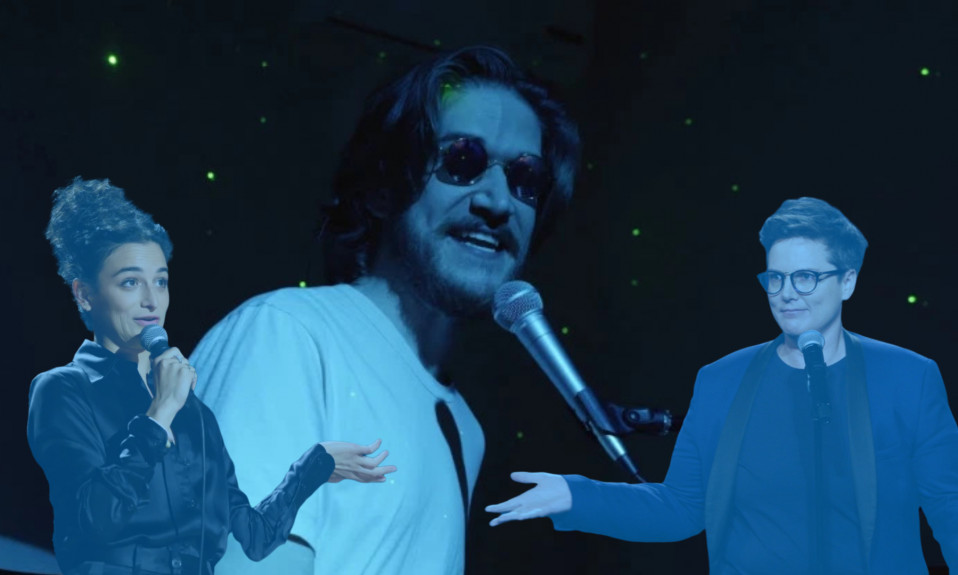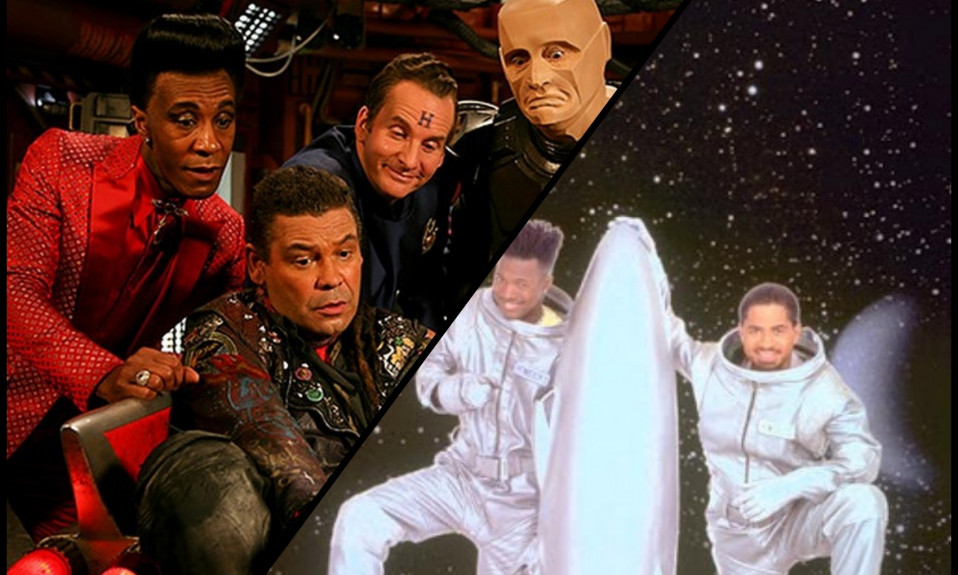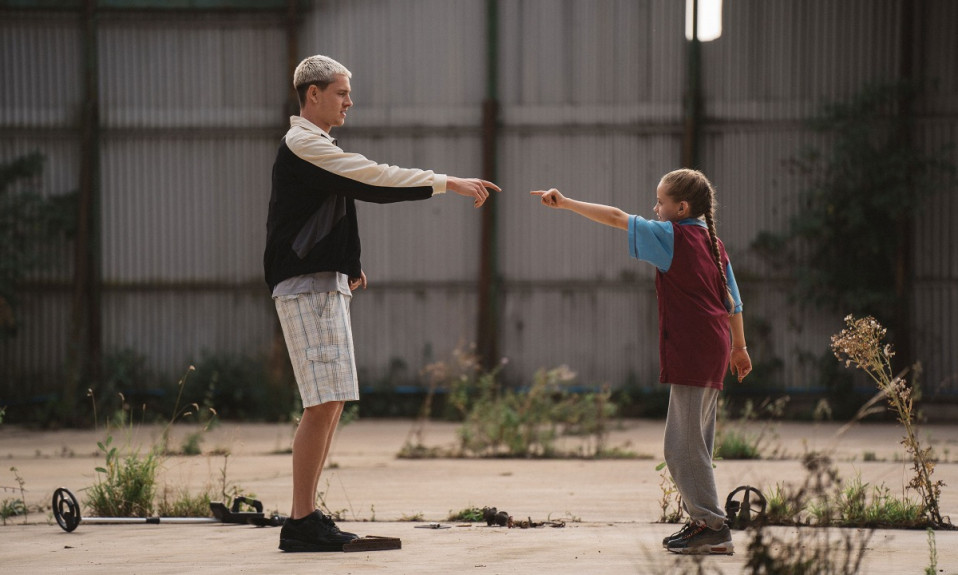By the time Bo Burnham sings “Welcome to the Internet” during his latest comedy special Inside, the feeling of existentialism is already high. He sits at his keyboard – an image of Burnham we’ve become used to since his early days on Vine – wearing John Lennon-style sunglasses, and is surrounded by small lights projecting dots of yellow and blue into the darkroom. The song has the sound of an Eastern European folksong, beckoning you into the circus of shit that is the internet. As the song builds, Burnham places the banal actions of the internet, like using Zoom, taking Buzzfeed quizzes, and catching up on the news, alongside the ease of becoming radicalised online; images of children killed by war or seeking refuge, and the unsolicited dick pics sent via DM. By the time the song ends, its polka rhythm slowing down like a heartbeat losing the will to live before a manic explosion of attention-grabbing sounds and lyrics, you feel both entertained and utterly depressed.
As stand-up comedy goes, Burnham, like other comedians such as Bill Bailey, Hall and Oates, or the late, great Victoria Wood, has always used well-written parody songs that are keenly focused on the ways in which our modern times are fucking us up. Inside is a significant step forward. Made in the isolation of the pandemic which, Burnham admits, had profoundly negative effects on his mental health, the special dissects our world, which is increasingly spiralling towards destruction, and it feels like something very new; totally personal and wholly political.
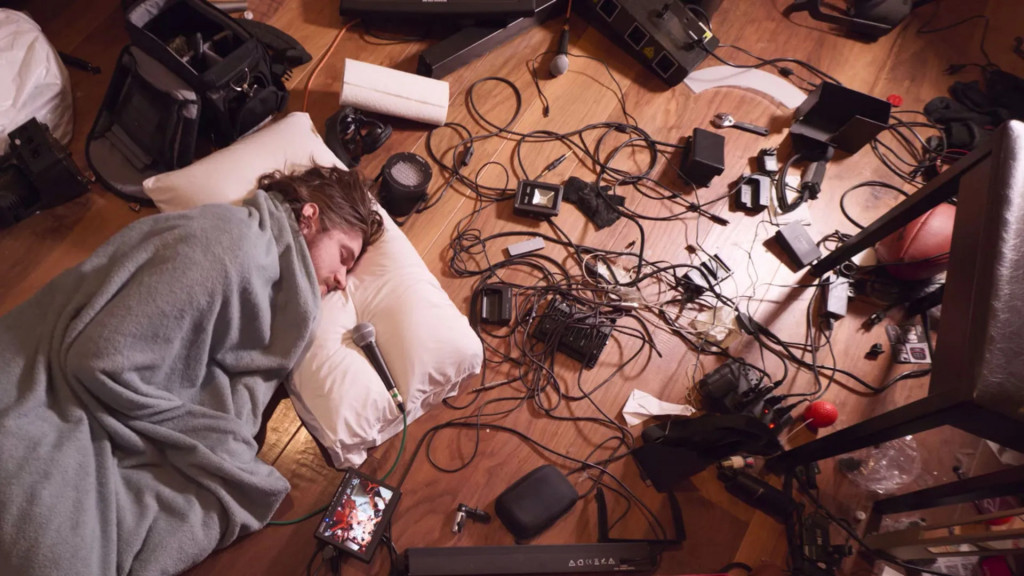
When I think about the comedy I watched a child, that inoffensive four-quadrant comedy, the kind that fills arenas or primetime slots on a Saturday night, I wonder if there’s much interest in that now. Of course, it’s still a booming industry, and a lot of the more, shall we say, “classic” comedians still release DVDs in time for Christmas, but they don’t have the cultural relevancy they used to. As a kid, jokes by comedians like Peter Kay, Jimmy Carr, or Michael McIntyre bled into the lexicon of my family and friends, onto the playground too, but that doesn’t seem to happen anymore. Instead, that type of comedy gives way to smaller, more intimate, hybrid pieces of work that blur the lines between humour, cultural criticism and memoir. Of course, this type of work isn’t new, but it has become increasingly more impactful.
As the poet Cathy Park Hong points out in her essay on stand up, most of what comedians say, when written down in front of you, isn’t funny; it is, in fact, all about the delivery. Indeed, to read Burnham’s lyrics to “Welcome to the Internet” is like reading a very depressing rhyming poem, but to see him perform it with a manic grin and the gusto of the ringleader to a dying circus desperate for your custom gives it all an eerie feeling that you can’t help but laugh at. Elsewhere, during Inside, Burnham flits between more cultural commentary, including two short songs on the billionaire and real-life supervillain Jeffery Bezos, the ethical implications of hiring unpaid interns, and how certain American white women use Instagram. For other songs, he moves into more personal territory, like in “All Eyes On Me”, which explains his five-year break from comedy due to panic attacks, or “Problematic”, in which he unpacks his history as a comedian that cut his teeth on the internet and all of the questionable things he’s joked about.
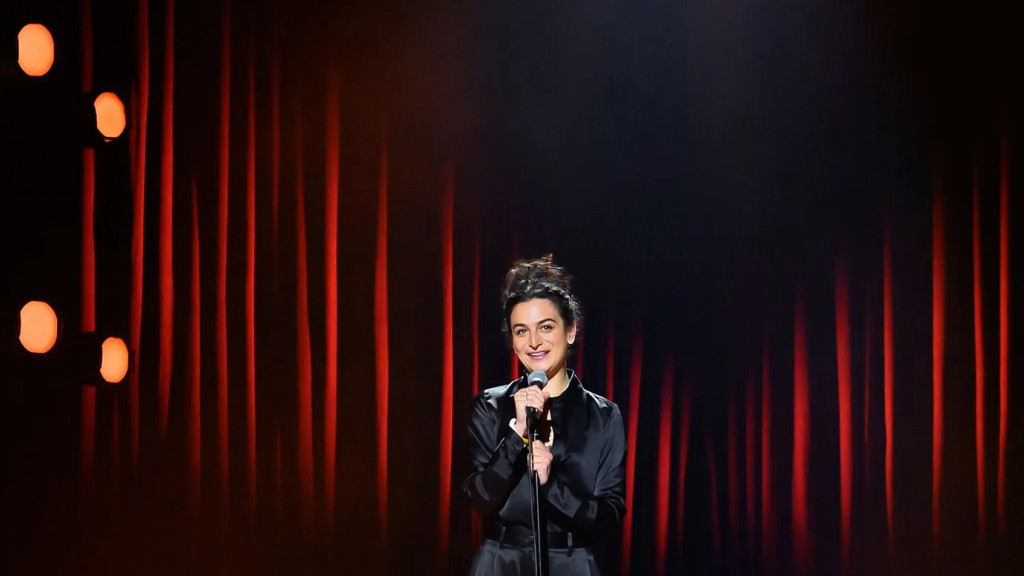
Burnham isn’t the only comedian excelling in the more personal realm, though. I recently re-watched Jenny Slate’s 2019 special Stage Fright, which Rachel Syme, for The New Yorker, described as “not so much an hour of punch lines (though it has plenty)” but rather “a daffy window into Slate’s influences and anxieties and appetites, a way to show viewers exactly where she came from.” Slate’s special indeed runs deeply personal; she includes interviews with her parents, sisters, and grandparents about their upbringing and the house they lived in. At the same time, her final run of jokes revolves around her attempts to rebuild herself following her divorce. Slate’s special is intensely personal and earnest, yet it doesn’t aim for the same cultural target as something like Inside. Instead, Stage Fright manages to say a lot about women in Hollywood, depression, and anxiety without going for the jugular. For example, she critiques what it means to be a woman, and, to quote Syme again, when she tries on her grandmother’s old clothes in one documentary section, she magnifies “the push-pull tensions that come with loving clothes while also wanting to reject the male gaze or the need to conform to any specific beauty standard.”
This seeming shift in comedy, away from that universal observation (“Hey, what’s the deal with aeroplane food?”) and into examining a more particular milieu of what it means just to be alive in what feels like the end of days is difficult to pin down. Might it be sensible to assume this shift comes as a response to an attack on comedy? It’s certainly possible. In post-Trump, post- #MeToo world, the peddled image of so-called “edgy” comedians being rounded up in a witch hunt, the reprobates – your Cosbys and C.Ks – being banished (well, kind of…) is used to mark the death of comedy. Often these jokes are marred by stereotypes or broad generalisations, which comedians like Burnham and Slate avoid. Yet, for the most part, the best comedians have adjusted to this new reality, have stuck to the golden rule of comedy, and continue to “punch up”. The shift into more personal work that ties politics to experience is certainly less “preachy” than standing on a stage and shouting your opinions. It feels more considered than generalising jokes about how wives put up with their husbands, how girlfriends nag and don’t want sex. Still, it doesn’t feel like these comedians are actively running away from it because they’re scared; it simply doesn’t interest them.
Instead, they’re drawn to a different kind of comedy, one that pulls us in then devastates us. This might actually be better positioned as a response to our over-saturation as a culture than to comedy’s untimely end. Just like Burnham’s “Welcome to the Internet” provides a speedy onslaught of bad things, our phones ping us notifications in the exact same way. We have ten years to halt the climate crisis, Greece is on fire, police brutality still faces little consequence, news boats loaded with cameras chase dinghies carrying refugees across The Channel, your Cosbys and your C.Ks get off with a slap on the wrist before planning “comeback” tours. We face a constant barrage of bad news until we can’t really take it in anymore. So comedy works around it.
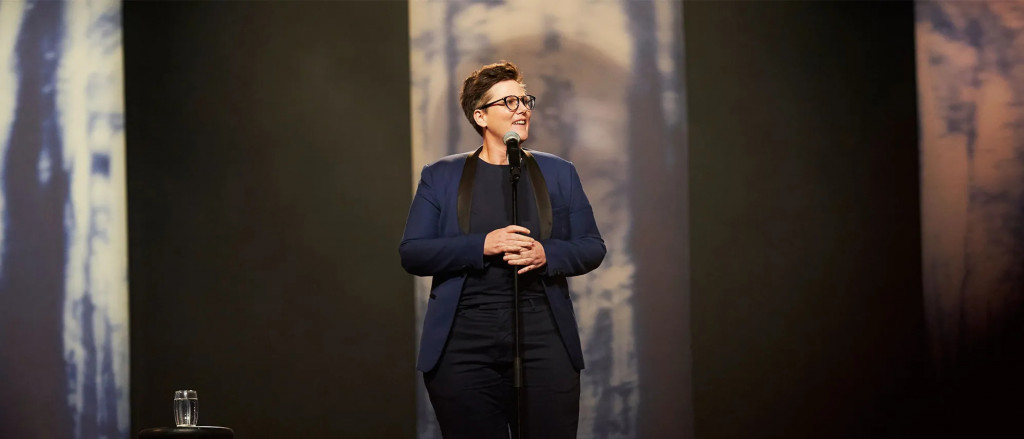
These days, comedians with a message work to disarm us. Park Hong writes that “Real laughter is an involuntary contraction that bursts out like an orgasm.” Meaning that we’re vulnerable to laughter, and being made to laugh is a revealing thing about your sense of humour, about who you are. It often means that when comedians like Burnham, Slate, or Hannah Gadsby, for example, shift into something soul-shattering, we feel it so much harder because we’re already open.
Yet, even then, I don’t know if we can really take it. It seems like our saturation is akin to slapping more and more paint onto a wall before it’s fully dry first. We can’t absorb anything and it’s detrimental to our existence. It’s been a month since Inside debuted on Netflix and, after a series of think-pieces and a solid critical response, the special has been dismantled for parts and repurposed for Tik Tok videos that remove the lyrics from their context. It seems these comedians want to tell us something, and part of us wants to hear it, yet we aren’t totally willing, or maybe we’re not even able, to listen.
Also Read: How Film Changed Me: On the Return of Carrie Bradshaw


